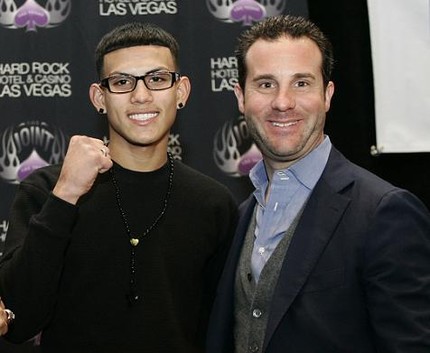Scorecard controversy leaves no argument about Benavidez’ career
By Norm Frauenheim

Controversial decisions and interim titles are little bit like scars. If you haven’t got at least one of them, it’s time for a different line of work. It’s a mixed bag, but it’s a sure a way to measure progress in a chaotic game.
Jose Benavidez Jr. returned to Phoenix from his Dec. 13 victory over Mauricio Herrera in Las Vegas with two of them – a controversial unanimous decision and the World Boxing Association’s interim version of the junior-welterweight title. There were no scars. Not yet anyway. But it’s safe to say that they’ll be there in bigger fights for the unmarked and unbeaten 22-year-old.
His career was launched in one night.
There’s been plenty of reasonable debate about the cards. It continued on web sites and in social media for a couple of days after the 116-112, 117-111, 116-112 scores were announced and then booed. Subsequent attention on Benavidez might not have been there had he stopped Herrera.
In this era of short-attention spans, an extra day or two of tweets and blogs add up to potential marketability. Above all, there’s interest in a rematch. Herrera, who argued his work-rate and body- punching were ignored by the judges, said he wants one.
“If he wants a rematch, sure,’’ Benavidez told 15 Rounds while standing in a ballroom outside of The Cosmopolitan’s arena with the interim belt hanging off his right forearm like a charm bracelet. “He’d be easier to fight.’’
Benavidez said it coolly.
Confidently.
That cool, confident persona was there before opening bell and throughout 12 rounds. Despite doubts about his experience and his ability to go the distance, there was never a word, tone or gesture that said Benavidez ever had a doubt about what would happen or how it would happen.
Even in negotiations for the fight, Benavidez raised some eyebrows when he said no to an offer to fight at a catch-weight – 142 or 143 pounds – in a 10-rounder with no title at stake.
But Benavidez didn’t want an interim step.
He wanted an interim title, the first major belt won by an Arizona fighter since Hall of Fame junior-flyweight Michael Carbajal, who held the WBC and IBF titles before retiring as the WBO champ after a victory over Jorge Arce in 1999.
The day before opening bell, there was another surprise. The 6-foot Benavidez stepped on to the scale at 138.5 pounds, lighter than the shorter Herrera. He looked drawn, refugee hungry. It looked as if he couldn’t last eight rounds, much less 12. Maybe, that’s what he wanted Herrera to think.
Then came the biggest surprise of all. In the opening round, his back was on the ropes and his hands were up in a defensive posture. It was a tactic he used throughout the fight. His father and trainer, Jose Benavidez Sr., kept urging him to get off the ropes and into the center of the ring.
“My dad didn’t want me there, didn’t want me on those ropes,’’ said the junior Benavidez, whose 18-year-old brother, super-middleweight David Benavidez, makes his American debut Saturday night in Phoenix at Celebrity Theatre on a UniMas-televised card (6 p.m. MST) that includes Top Rank prospect Oscar Valdez and heavyweight Andy Ruiz against former champion Sergei Liakhovich. “But I wanted to go 12 rounds. That was important to me. Nobody thought I could do it.’’
He conserved his energy, which allowed him to fight in furious bursts with eye-catching punches, including a jab that is as long and lethal as any. The judges noticed, prompting an argument about whether they were watching at all.
Yes, the punch stats say Herrera outworked Benavidez by a wide margin. He threw 870 punches; Benavidez threw 647. Arguments en behalf of Herrera, however, often exclude accuracy. Benavidez landed 39 percent; Herrera 33 percent.
Stoppages are the result of a punch that lands. Not one that misses. But there are judges whose scoring philosophy favors defense over aggressiveness and vice-versa. It’s not clear-cut and never should be. If Benavidez is as successful as many now expect, he one day will feel as fleeced as Herrera did. Like interim titles, controversy, scars, death and taxes, that’s inevitable.
Against Herrera, however, he displayed an instinctive feel for what, how and when to act. Frustration at the scoring includes complaints that he stole rounds. No doubt bout it. His quick bursts of energy and accuracy won rounds that otherwise might have been even or scored for Herrera. But stealing rounds is a time-honored skill, as fundamental as a jab. Floyd Mayweather Jr. does it. Bernard Hopkins does it.
So does Benavidez, despite his youth and inexperience. Go ahead and argue that Herrera got robbed. Fair enough. But don’t compound the theft by robbing Benavidez of credit for a surprising performance that says this interim champion might be champ for a long time.